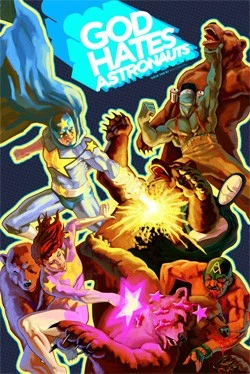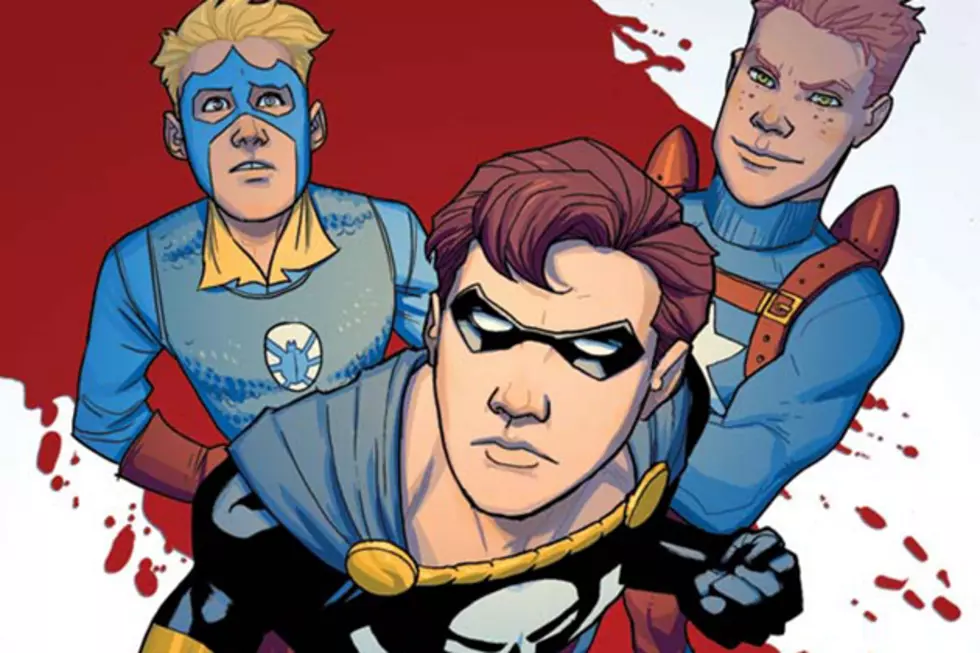![Ryan Browne Talks ‘God Hates Astronauts,’ ‘Blast Furnace’ And The Kickstarter Audience [NYCC 2012]](http://townsquare.media/site/622/files/2012/10/ryanbrowne.jpg?w=980&q=75)
Ryan Browne Talks ‘God Hates Astronauts,’ ‘Blast Furnace’ And The Kickstarter Audience [NYCC 2012]

I've been a fan of Ryan Browne for years based on God Hates Astronauts, the comic where he does superheroes being jerks to each other better than just about anyone else who tries, but his new book, Blast Furnace has exactly the kind of quirky twist that I love. It started as what Browne calls an "Improv Comic," with each page done in an hour without any plans or writing before the pencil hit the paper.
Unfortunately, Blast Furnace didn't go over all that well with Browne's established audience, but he still managed to successfully fund a Kickstarter by finding an audience outside of the people who were already familiar with his work. At New York Comic-Con, I talked to Browne about why he wanted to experiment with the format, his experience with the Kickstarter audience, and what his plans are for a God Hates Astronauts collection. ComicsAlliance: I'm a big fan of God Hates Astronauts, but I always like to hear people describe their own work when it's a big, weird, high concept book.
ComicsAlliance: I'm a big fan of God Hates Astronauts, but I always like to hear people describe their own work when it's a big, weird, high concept book.
Ryan Browne: God Hates Astronauts is about a bunch of small-minded, self-centered, super-powered jerks who were hired by NASA to stop farmers from launching themselves into outer space in homemade, alcohol-fueled grain silos turned into spaceships, but that never really gets addressed because they're too busy having extramarital affairs, fighting bank-robbing owls with crossbows, boxing old-timey bears, ghost cow heads, tigers eating cheeseburgers and all that stuff.
CA: You also did a book called Blast Furnace that you said started as an "improv comic."
RB: It was kind of born out of Scott McCloud's 24-Hour Comics project, which I love doing, where you make a 24-page comic in 24 hours, without any pre-planning. I wanted to do that in a more long-form way as an exercise in telling a story quickly, so I didn't have to worry about finishing the art or coloring it. Blast Furnace ended up being a comic where I did a page per day, an hour a page, for about six months. I made it up as I went along. I designed a character and came up with a title and just went with it. I just start writing a page, and here's what happens.
CA: The fact that you can do a full page in an hour is why writers hate artists.
RB: [Laughs] It's not a good page, though!
CA: If you go in knowing it was drawn in an hour, they look pretty good! What was that like? Was it a challenge to come up with something different every day, or did you end up doing a lot of filler pages?
RB: What I realized pretty early on is that it was going to be pretty unfocused. If I was going to do six months of story, which is six issues, I made it so that I wanted to have some sort of conclusion at the end of each month, just so it wouldn't go totally off the rails. Then, because it was going to be so unfocused, I was like, "all right, I'll take the story wherever I want it." There's actually flashbacks within flashbacks within flashbacks. If I needed a character to show up for a story moment, all the sudden it jumps into his backstory. It's like an onion, it just keeps going back and back and back, and it's super unfocused and crazy.
CA: What was the audience response to it?
RB: Very poor. It was black and white, and I didn't get a lot of my audience to carry over. Those who do read it, a lot of them liked it more than God Hates Astronauts, and I actually think it's better and funnier, but the art is not as finished. Drawing people in has been more of a chore.
Now that I did a Kickstarter for it and put it all together in a nice package, now it has a good audience. I thought people would want to read a webcomic that updated every day, but it was like "I'll just read it every Friday, and then I'll have five pages every week," and it didn't work out so well. But I think being black and white has a lot to do with it.
CA: Were there people contacting you about it, or making suggestions on what to do next?
RB: Not at all. The fanbase of God Hates Astronauts did not care. It was very strange.
CA: So if your fanbase didn't carry over to it, how did the Kickstarter go?
RB: The Kickstarter ended up being largely backed by a Kickstarter audience that just found it on its own. I wanted $2000 to cover the printing, and I funded it within the first six hours. Those were mainly my existing fans, but after that, it was all people who found it through Kickstarter, and when all was said and done, around 80% of it was people that I'd never heard of and that had never heard of me or read God Hates Astronauts. They just saw the project, liked the video and the idea, and backed it. I've got a whole new audience that expanded from Kickstarter.
CA: Not to dis your book, but there is a gimmick to it, and I've noticed that a lot of Kickstarter backers tend to really like those quirky gimmicks.
RB: I think that helped it a lot. I have it all online, so there were a lot of people that saw the video and started reading it online, and they told me they stopped because they enjoyed it so much they wanted to buy the book.
A big thing for me was that if you're going to do a Kickstarter to print something, it's important to have it done. You want to have a good turnaround time; people are investing in you and you want to do them the favor of giving them the product sooner rather than later. The fact that I had it all done and let everyone read it also helped, beyond the gimmick of the improv comic. That brings them in, but when they can read it and see whether they like it or not, that helps a lot.
CA: And now you're doing a second kickstarter with God Hates Astronauts.
RB: I'm putting it together now. It's going to be a much larger endeavor than Blast Furnace. It's going to be at least 144 pages, hardcover, full color. It'll have all the oversized issues, and tons of bonus materials. The 24-Hour comic that inspired it, annotations and covers and pin-ups, and it's also going to have 20 origin stories that are written by me and drawn by artists that are better than me that I was able to convince and arm-twist into getting to work on the project.
CA: Who do you have?
RB: Lots and lots of people. Chris Burnham, Tim Seeley, Mike Norton, Ryan Stegman, Nick Pitarra's doing one. Everyone working on it is a professional artist working in comics, and all of them are better than me.
CA: Were they already fans? It seems like a book that a lot of artists would be into.
RB: It is. It is a creator's book. It's so weird, my following's very cultish. 999,999 out of a million don't know the book, but that one who does is ravenous about it. I don't know why that is, but it has that Adult Swim kind of following, and a lot of them are creators. A lot of my success as a webcomic has been creators finding it and then sharing it with other creators and spreading the word, so now I'm trying to trick them into working with me on it.
More From ComicsAlliance
![Ryan Browne And Pete Woods On Their Superhero Satire ‘Project Superpowers: Hero Killers’ [Interview]](http://townsquare.media/site/622/files/2017/03/Hero-Killers-Featured.png?w=980&q=75)
![The Cats Deserve Their Fame: Ananth Hirsh and Yuko Ota Dive Back Into ‘Johnny Wander’ [Interview]](http://townsquare.media/site/622/files/2017/03/JWOMNI-COVER-ONI-PRESS-EDITION-4x6-COMP-CA-FEATURED-IMAGE.jpg?w=980&q=75)
![Steven Andrews Offers a Tour Of Toronto In ‘Yonge at Heart’ Anthology [Back Pages]](http://townsquare.media/site/622/files/2017/03/yongeatheart-feat.jpg?w=980&q=75)

![Hanging Out With Flair, Being Best Friends With ‘The King': Mike Kingston’s Absurd Journey to ‘Headlocked: The Hard Way’ [Interview]](http://townsquare.media/site/622/files/2017/03/HTHW-Promo-2.jpg?w=980&q=75)

![Show Your Cards With Queer Tarot Anthology ‘Tabula Idem’ [Back Pages]](http://townsquare.media/site/622/files/2017/02/TI2.png?w=980&q=75)
![Damian Duffy Helps Shines A Spotlight In ‘Black Comix Returns’ [Back Pages]](http://townsquare.media/site/622/files/2017/02/blackcomix-feat.png?w=980&q=75)

